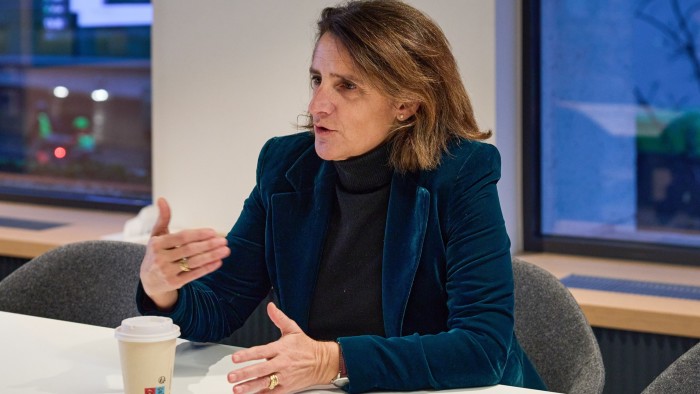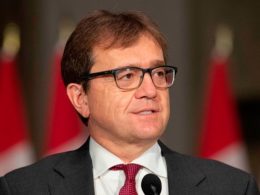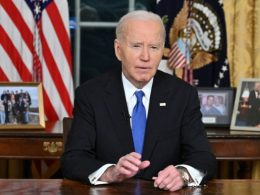Good morning. The European Commission is considering using EU subsidies to boost demand for electric vehicles, its executive vice-president Teresa Ribera tells my colleagues at the World Economic Forum in Davos.
Below, our Europe editor has more from Ribera on her plans to boost EU competitiveness in the face of US brinkmanship. And our Rome bureau chief unpacks Italy’s release of an alleged war criminal.
Not that simple
Donald Trump’s blizzard of executive orders since returning to the White House has made Europe’s competitiveness problem all the more stark, writes Ben Hall.
Context: With animal spirits roaring on the other side of the Atlantic, many delegates at the World Economic Forum in Davos this week have been struck by the relatively bleak economic outlook for Europe.
Speaking in Davos, European Commission president Ursula von der Leyen vowed to make it easier to do business in Europe. But with Trump preparing to rip up federal regulation and rethink the parameters of government action, the EU’s moves look altogether more tentative.
“The engagement is not to deregulate, but to simplify,” European Commission executive vice-president Teresa Ribera tells the Financial Times.
Ribera, a socialist and former deputy prime minister of Spain, rejects suggestions that the EU should roll back its ambitious decarbonisation agenda, now that Trump has withdrawn the US from the Paris climate agreement.
She argues that scrapping rules, such as the ban of new petrol cars from 2035, would deprive businesses of certainty, which EU officials are touting as an attraction of the European market in an era of Trumpian upheaval.
But Ribera adds: “It is also true that in some cases, we have this tendency to combine the demands coming from here and there, and at the end . . . different layers of administration get into similar things.”
This can result in “lots of repetition”, she says, adding that member states’ different rules can complicate things further. “For the same thing it may take three months, six months in a country — or two years in another country, and it doesn’t make sense.”
One area for simplification is merger rules, competition policy being Ribera’s other responsibility alongside greening European industry.
Ribera says she is looking for a system whereby EU antitrust enforcers concentrate on the biggest, most complex cases, and nod through others if they meet certain guidelines.
She says that efforts to diagnose and assess market conduct may concentrate “on those aspects that are more important”.
“In many other aspects . . . mergers can take place without such an in-depth assessment coming from the competition authorities.”
Chart du jour: Changing course
Tankers carrying LNG from the US to Asia are diverting to Europe, as traders eye profits from high energy prices.
Free to go
The International Criminal Court has demanded information from the Italian authorities on why they released a Libyan official sought for war crimes and crimes against humanity, writes Amy Kazmin.
Context: Italy has paid millions of euros to Libyan security forces — which mainly consist of armed militias that control the state apparatus — to stop people from crossing the Mediterranean Sea. The same militias have been accused of trafficking migrants; and people intercepted by them are often subjected to imprisonment, torture and de facto enslavement.
The wanted official, Osama Elmasry Njeem, was allegedly in charge of prisons in Tripoli where thousands of people were held, according to the ICC. He is suspected of crimes including murder, torture, rape and sexual violence, which the ICC said were either committed or ordered by him over a decade.
Njeem was arrested in Turin at the weekend. But rather than handing him over to the ICC, justice minister Carlo Nordio on Tuesday released Njeem, citing procedural irregularities during his arrest, and flew him back to Libya on a government plane.
In a statement published yesterday, the ICC said the release happened “without prior notice or consultation with the Court”, as it reminded Italy of “the duty of all States Parties to co-operate fully with the Court in its investigations and prosecutions of crimes”.
The court said it was still waiting for information about the release.
Meanwhile, humanitarian organisations and Italy’s opposition have been up in arms.
Refugees in Libya slammed the government for its “act of complicity” with Libya’s “mafia system”. “Rome betrayed the Rome statute,” the group said, referencing the treaty establishing the ICC, which Italy signed.
Former prime minister Matteo Renzi asked how the release could be reconciled with premier Giorgia Meloni’s commitment to fighting human traffickers.
“When a trafficker comes along who the ICC tells us is a dangerous criminal . . . you released him,” Renzi said in parliament yesterday. “This is the image of a hypocritical and indecent government.”
What to watch today
-
US President Donald Trump addresses World Economic Forum in Davos via video call.
-
UNRWA high commissioner Philippe Lazzarini meets EU officials in Brussels.
Now read these
-
‘Sneakers on the ground’: It’s an open secret that some western special forces are present in Ukraine. But will Europe put actual “boots on the ground”?
-
Versace meets Louis XVIII: The Louvre is unveiling a couture exhibition — the first to focus on fashion in the museum’s history.
-
Special relationship: Donald Trump has called Italy’s premier Giorgia Meloni a “fantastic woman”. Can she persuade him to hold off on tariffs?
Are you enjoying Europe Express? Sign up here to have it delivered straight to your inbox every workday at 7am CET and on Saturdays at noon CET. Do tell us what you think, we love to hear from you: europe.express@ft.com. Keep up with the latest European stories @FT Europe









